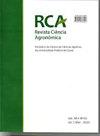干旱条件下crambe基因型形态农艺性状和生理性状的遗传参数
IF 0.7
4区 农林科学
Q3 AGRICULTURE, MULTIDISCIPLINARY
引用次数: 0
摘要
本文章由计算机程序翻译,如有差异,请以英文原文为准。
Genetic parameters of morpho-agronomic and physiological traits of crambe genotypes under drought conditions
- This work aims at evaluating and discriminating crambe genotypes regarding tolerance to water de fi cit by means of morpho-agronomic and physiological traits. The trial was carried out in a greenhouse under a randomized complete block design with four blocks, in a 2 x 8 factorial scheme, being two environments (with and without stress) and eight genotypes (FMS CR 1101, FMS CR 1106, FMS CR 1203, FMS CR 1305, FMS CR 1307, FMS CR 1312 and FMS CR 1326 and cultivar FMS Brilhante). The genotypes were evaluated according to physiological and morpho-agronomic traits. The signi fi cance of the mean squares was tested by the F test (P < 0.05) and the genetic parameters were estimated as ratio b between the genetic (CVg) and experimental (CVe) coef fi cients of variation, broad-sense heritability at genotypic mean level ( 2 ˆ m h ), intraclass correlation (r) and selective accuracy (Ac). In general, water de fi cit did not cause severe physiological limitations to the plants. Plant height (PH), total dry mass (TDM) and grain yield (GY) were the traits that stood out for presenting the highest estimates of ratio b, 2 ˆ m h , CVg and r, revealing the possibility of genetic gains with the selection. Nevertheless, after evaluating the performance of genotypes in terms of physiological and morpho-agronomic traits, it was concluded that cultivar FMS Brilhante and inbred lines FMS CR 1326 and FMS CR 1106 had the most favorable traits for the selection, therefore, presenting potential for water de fi cit tolerance
求助全文
通过发布文献求助,成功后即可免费获取论文全文。
去求助
来源期刊

Revista Ciencia Agronomica
Agricultural and Biological Sciences-Horticulture
CiteScore
2.00
自引率
0.00%
发文量
41
审稿时长
4-8 weeks
期刊介绍:
To publish technical-scientific articles and study cases (original projects) that are not submitted to other journals, involving new researches and technologies in fields related to Agrarian Sciences. Articles concerning routine analysis, preliminary studies, technical notes and those which merely report laboratorial analysis employing traditional methodology will not be accepted for publication. The Journal of Agronomical Science also has the mission to promote the exchange of experience in the referred fields.
 求助内容:
求助内容: 应助结果提醒方式:
应助结果提醒方式:


